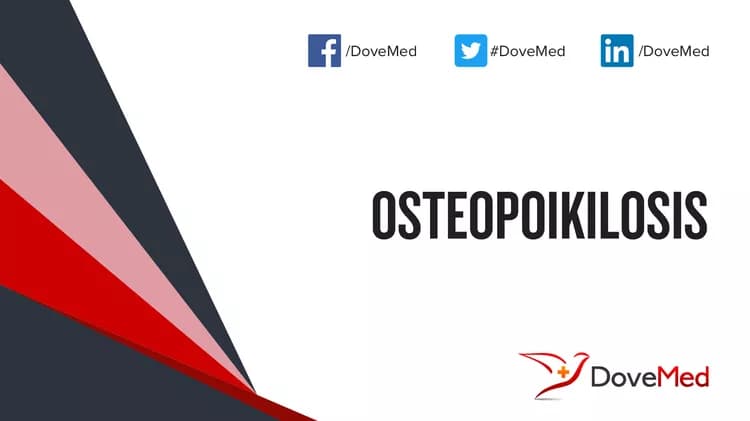What are the other Names for this Condition? (Also known as/Synonyms)
- Osteopathia Condensans Disseminata
- Spotted Bones
What is Osteopoikilosis? (Definition/Background information)
- Osteopoikilosis is a condition in which many small, roundish spots are found in the bones, particularly near the joints. These spots are areas of bone tissue that did not develop properly and are exceptionally dense. They usually do not cause symptoms and do not change over time
- Osteopoikilosis can be diagnosed at any age and is often detected by chance when an otherwise healthy individual has X-rays for an unrelated reason, such as injury
- This condition may occur randomly with no other features (sporadic), or may be inherited from a parent as a part of Buschke Ollendorff syndrome
(Source: Osteopoikilosis; Genetic and Rare Diseases Information Center (GARD) of National Center for Advancing Translational Sciences (NCATS), USA.)
Who gets Osteopoikilosis? (Age and Sex Distribution)
- Osteopoikilosis is a rare bone disorder with an estimated prevalence of 1:50,000
- Individuals of all ages and both genders may be affected by this condition
- Worldwide, all races and ethnicities may be affected
What are the Risk Factors for Osteopoikilosis? (Predisposing Factors)
- A positive family history may be an important risk factor, since Osteopoikilosis can be inherited as part of a syndrome
- Currently, no other risk factors have been clearly identified for Osteopoikilosis
It is important to note that having a risk factor does not mean that one will get the condition. A risk factor increases one’s chances of getting a condition compared to an individual without the risk factors. Some risk factors are more important than others.
Also, not having a risk factor does not mean that an individual will not get the condition. It is always important to discuss the effect of risk factors with your healthcare provider.
What are the Causes of Osteopoikilosis? (Etiology)
- Osteopoikilosis is caused by improper development of bone tissue during development, with dense spots predominantly near the joints
- The condition can develop sporadically or may exist as part of a Buschke Ollendorff syndrome, which is inherited from a parent
- The inherited form is caused by mutation(s) in LEMD3 gene, and transmitted in an autosomal dominant manner
Autosomal dominant inheritance: Autosomal dominant conditions are traits or disorders that are present when only one copy of the mutation is inherited on a non-sex chromosome. In these types of conditions, the individual has one normal copy and one mutant copy of the gene. The abnormal gene dominates, masking the effects of the correctly function gene. If an individual has an autosomal dominant condition, the chance of passing the abnormal gene on to their offspring is 50%. Children, who do not inherit the abnormal gene, will not develop the condition or pass it on to their offspring.
What are the Signs and Symptoms of Osteopoikilosis?
No significant signs and symptoms have been reported for Osteopoikilosis.
How is Osteopoikilosis Diagnosed?
Osteopoikilosis is diagnosed on the basis of the following information:
- Complete physical examination
- Thorough medical history evaluation
- Assessment of signs and symptoms
- Laboratory tests
- Imaging studies such as bone X-ray, which may show small, roundish and dense spots near joints
Many clinical conditions may have similar signs and symptoms. Your healthcare provider may perform additional tests to rule out other clinical conditions to arrive at a definitive diagnosis.
What are the possible Complications of Osteopoikilosis?
No complications from Osteopoikilosis have been generally reported, since the condition is asymptomatic.
How is Osteopoikilosis Treated?
No treatment is typically necessary for Osteopoikilosis, since affected individuals do not exhibit any symptom(s).
How can Osteopoikilosis be Prevented?
- Currently, Osteopoikilosis may not be preventable, if it is associated with a genetic disorder
- Active research is currently being performed to explore the possibilities for treatment and prevention of inherited and acquired genetic disorders
- Regular medical screening at periodic intervals with tests and physical examinations are recommended
What is the Prognosis of Osteopoikilosis? (Outcomes/Resolutions)
- The prognosis of Osteopoikilosis is good, if it occurs in isolation. No symptoms or complications are reported for this disorder
- However, if the condition occurs as part of a syndrome, such as Buschke Ollendorff syndrome, then the outcome may be determined by the severity of the signs and symptoms of the syndrome, and associated complications, if any
Additional and Relevant Useful Information for Osteopoikilosis:
The following DoveMed website link is a useful resource for additional information:
Related Articles
Test Your Knowledge
Asked by users
Related Centers
Related Specialties
Related Physicians
Related Procedures
Related Resources
Join DoveHubs
and connect with fellow professionals


0 Comments
Please log in to post a comment.